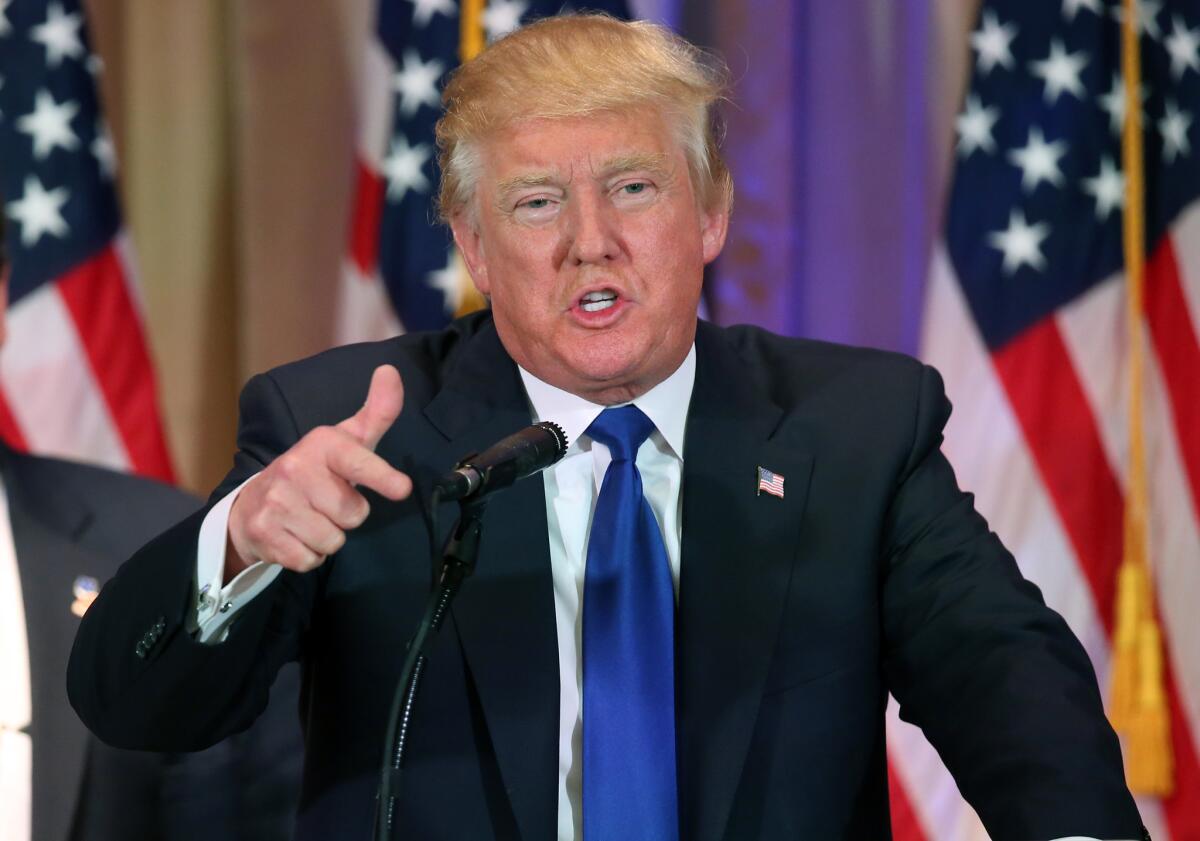Trump promised a ‘beautiful’ healthcare plan, but it’s pretty basic

Republican presidential candidate Donald Trump, shown earlier this week, on Wednesday released a plan titled “Healthcare Reform to Make America Great Again.”
- Share via
Reporting from Washington — Donald Trump has at various times promised a healthcare plan that would be “beautiful,” “terrific” and “unbelievable.”
But the healthcare outline his campaign released Wednesday mostly highlights standard, if vague, Republican proposals, several of which conservatives themselves say will have little impact on patients’ health or their pocketbooks.
Trump, who is working to consolidate his position as the GOP presidential front-runner, pledges to repeal the 2010 Affordable Care Act, commonly called Obamacare. He repeats what had been the centerpiece of his healthcare discussions on the campaign trail: allowing health insurers to avoid state regulations and sell their plans anywhere in the country.
TRAIL GUIDE: All the latest news on the 2016 presidential campaign >>
And Trump champions several other pillars of conservative health policy. These include allowing all Americans to deduct their health insurance premiums, expanding use of tax-free health savings accounts and giving states more freedom to run their Medicaid safety net programs.
“We will work with Congress to make sure we have a series of reforms ready for implementation that follow free-market principles and that will restore economic freedom and certainty to everyone in this country,” the plan promises.
Notably missing from Trump’s plan -- titled “Healthcare Reform to Make America Great Again” -- are promises that “everybody’s got to be covered,” or that he would “not allow people to die on the sidewalks,” as he claimed earlier.
Those pledges drew criticism from many conservatives, who saw them as code words for expanding government health insurance.
Trump in the past has advocated a single government health plan for all Americans, akin to systems in Canada and Britain. And although he has said more recently that “single-payer” would no longer work in the United States, he has praised those systems again during the campaign.
Trump is now proposing that Americans be allowed to buy drugs from Canada and other countries where prices are much lower. (That is a change from his earlier calls for Medicare to use its market power to negotiate lower prices for seniors).
Trump has also reversed his earlier support for a requirement that all Americans get health coverage.
Join the conversation on Facebook >>
The Trump campaign did not respond to requests for more details about his plans.
Meanwhile, Trump’s proposals drew new critiques from across the political spectrum.
“For the previously uninsured who now have health coverage, there is good reason to worry that their access to needed healthcare will be taken away under a Trump presidency,” warned Families USA Executive Director Ron Pollack, a leading consumer advocate and supporter of the current law.
To date, the law has expanded coverage to about 20 million Americans, driving the largest decline in the uninsured in at least half a century.
It is unclear what would happen to these people if Obamacare were repealed. Many have low or modest incomes and rely on government aid to get coverage.
Trump has not specified how he would help these people, beyond promising that his plans would make healthcare substantially more affordable.
That is disputed by many experts. Interstate sale of health insurance, for example, might slightly lower premiums, but would not address the much larger issue of high prices by hospitals and other medical providers, which are increasing their market power by consolidating in communities across the country.
“The biggest barrier to insurers getting into a market is forming a provider network. Allowing them to sell across state lines won’t do anything about that,” said Carnegie Mellon University economist Martin Gaynor, a leading critic of healthcare consolidations.
Trump’s proposal to give new tax breaks to Americans to help them buy health coverage also would likely have minimal impact because millions of poorer Americans don’t pay income taxes and would therefore be unable to use a tax deduction such as the one he is proposing.
“That’s not going to help,” warned Joe Antos, a leading conservative health policy expert at the American Enterprise Institute. Antos noted that Trump may mean that Americans should get a tax credit to help with health coverage, which, unlike a deduction, would benefit even people who don’t file income taxes.
“A lot might be clearer if we knew whom Trump plans to work with on healthcare,” Antos said. “But, of course, we don’t.” To date, the campaign has not indicated who is advising Trump about healthcare.
Nevertheless, with his new plan, Trump is offering more information about his healthcare platform than several of his rivals.
Texas Sen. Ted Cruz, who is currently in second place in the race for Republican delegates, has not posted any information about his healthcare plans on his campaign website.
And Ohio Gov. John Kasich, who has detailed proposals for improving medical care, has not outlined a broader system for replacing the current health law and its system of guaranteeing coverage.
Florida Sen. Marco Rubio, the fourth remaining GOP candidate, has arguably the most detailed healthcare platform, including proposals to create a new system of coverage to replace Obamacare and to overhaul Medicaid and Medicare.
On the Democratic side, former Secretary of State Hillary Clinton is proposing a series of new consumer protections that build on the existing health law, including more regulation of drug prices and insurance plans.
Her challenger, Vermont Sen. Bernie Sanders, has called for a single government health plan for all Americans.
Twitter: @noamlevey
MORE ON DONALD TRUMP
Los Angeles-area student may be deported after online Trump threat
Republican leaders are torn: Accept or reject Donald Trump for president?
Donald Trump-Megyn Kelly rematch and other things to watch for in the GOP debate
More to Read
Sign up for Essential California
The most important California stories and recommendations in your inbox every morning.
You may occasionally receive promotional content from the Los Angeles Times.














